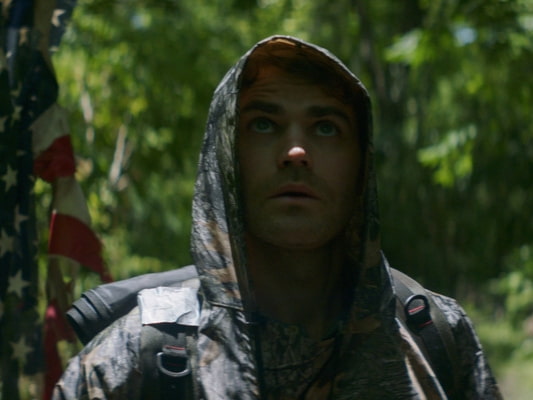Unveiling the shortcomings of ‘History of Evil’: heavy-handed politics overshadow horror. 🎬

Deconstructing “History of Evil”: When Politics Overshadow Horror
Introduction:
“History of Evil” enters the cinematic landscape with promises of political intrigue and spine-chilling horror. However, beneath its surface lies a narrative marred by unsubtle messaging and missed opportunities. As we delve deeper into the film’s themes and execution, it becomes evident that its ambitions exceed its grasp, resulting in a disjointed viewing experience that fails to leave a lasting impression.
Setting the Stage:
The film unfolds in a near-future America ravaged by civil unrest and political upheaval. Against this backdrop, protagonist Ron, portrayed by Paul Wesley, finds himself entangled in a web of personal and ideological turmoil. As the narrative unfolds, Ron’s journey serves as a microcosm of the larger societal struggles at play, mirroring themes of power, identity, and the insidious nature of extremism.
Also Read:- Pedro Pascal’s Unforgettable SAG Win: A Drunken Acceptance, Faux Feuds, and Viral Moments
A Study in Subtlety:
One of the film’s most glaring flaws is its lack of subtlety, particularly in its political allegory. From the overt naming of factions to heavy-handed dialogue and exposition, “History of Evil” leaves little to the imagination, opting instead for blunt force messaging that detracts from the narrative’s nuance. The film’s reliance on telling rather than showing undermines its potential for immersive storytelling, resulting in a narrative that feels contrived and didactic.
Character Dynamics and Development:
Central to the film’s narrative arc is Ron’s descent into darkness, as he grapples with questions of masculinity, loyalty, and personal agency. Wesley delivers a commendable performance, imbuing Ron with a sense of depth and vulnerability that is unfortunately undercut by the film’s heavy-handed approach. Despite the potential for compelling character development, Ron’s journey feels rushed and underdeveloped, leaving audiences craving a more nuanced exploration of his inner turmoil.
Also Read:- Barbra Streisand’s Timeless Triumph: A Lifetime Achievement Honored at the 30th SAG Awards
Missed Opportunities and Wasted Potential:
One of the greatest disappointments of “History of Evil” is its squandered potential. With a premise ripe for exploration and a talented cast at its disposal, the film falls short of delivering a truly compelling viewing experience. Rather than leveraging its political backdrop to explore complex themes of power and ideology, “History of Evil” resorts to tired tropes and superficial commentary, ultimately leaving audiences feeling unsatisfied and unengaged.
Aesthetic Considerations:
Visually, the film offers little to redeem its narrative shortcomings. While certain scenes evoke a sense of foreboding and unease, the overall aesthetic feels uninspired and derivative. From its predictable jump scares to its lackluster production design, “History of Evil” fails to create a truly immersive cinematic experience, relying instead on tired horror conventions that do little to elevate its narrative.
Conclusion:
In conclusion, “History of Evil” is a film that falls short of its lofty ambitions. Despite its promising premise and talented cast, the film ultimately succumbs to heavy-handed messaging and narrative missteps. While there are moments of tension and intrigue scattered throughout, they are overshadowed by the film’s lack of subtlety and depth. As audiences navigate the twists and turns of Ron’s journey, they are left yearning for a more nuanced exploration of the film’s themes and characters. In the end, “History of Evil” serves as a cautionary tale of the pitfalls of prioritizing politics over storytelling, reminding us that true horror lies not in the supernatural, but in the failure to engage and captivate an audience.
